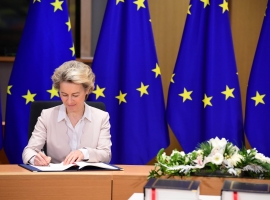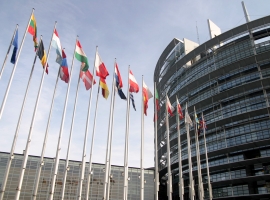
Europe's big telecom firms are back to rude financial health after years of poor results and regulatory pressure, drawing crowds of new investors and protests from rivals who worry the formerly state-owned companies may rebuild their monopolies.
Germany's Deutsche Telekom and Spain's Telefonica have predicted that revenues will grow this year, while France's Orange and Norway's Telenor have promised higher future dividends, a major motivation for investors in the sector.
The renaissance is a marked shift from the past five years in which the sector's sales fell steadily because of regulation ending various types of mobile fees and tough competition from cable operators such as Liberty Global and low-cost players like France's Iliad.
Sector executives credit the improvement to new 4G technology that powers speedier mobile broadband, as well as a more relaxed attitude by regulators to mergers and acquisitions, and the fees the former state firms can charge to share their networks.
All this has translated into a 15 percent rise in the European telecoms index this year, after a 7.5 percent rise last year.
Consequently the once yawning valuation gap between U.S. and European telecoms has reversed, with the European sector now trading at 19.3 times forward price to earnings compared with 14 times for U.S. peers such as AT&T and Verizon.
After recent years of recession, the new European Commission under President Jean-Claude Juncker wants to spur growth in part by encouraging telecoms firms to invest in faster broadband infrastructure, which underpins the modern economy.
By way of incentive, Brussels has decided that when telecoms companies build new high-speed fibre lines they may charge rivals commercial rates to use them, rather than the regulated rates that were introduced in the 1990s to inject competition into the markets.
The regulators are also taking a softer line on consolidation, prompting a wave of activity: since December 2012, antitrust authorities have approved mobile deals in Austria, Ireland and Germany, as well as Vodafone's purchases of cable operators in Germany and Spain.
ECTA, the trade association for alternative operators such as Iliad and Talk Talk, warns however that such policies have tipped the balance too far to the big firms.
Its claim is given weight by a Citigroup report titled "The Rebirth of the telecom monopoly" last November that showed a decrease in competitiveness in 25 global mobile markets since late 2011, a shift from the prior decade when incumbents were losing clients.
The recent rapid re-making of the British market sums up the big players' rebirth.
BT Group, the former state-owned entity that was focused on fixed telephony and broadband, has agreed to buy the country's biggest mobile provider EE. This recreates an integrated market leader in Britain just as Telefonica dominates in Spain or Orange in France, competition advocates warn.
BT's rivals, including heavyweight Vodafone - which grew by stealing mobile business from the former monopolies - are calling for closer monitoring of the new leader and a full separation of the Openreach unit that makes its network available to competitors.
"Some operators can use their networks as a fortress," Vodafone boss Vittorio Colao told an audience of lobbyists and policy makers at an event in Brussels on Thursday.
"We cannot afford to have remonopolisation in Europe." (Reuters)
For more visit: www.businessworld.ie

















